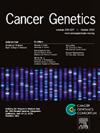伴有罕见PTEN突变的肋骨尤文氏肉瘤
IF 2.1
4区 医学
Q4 GENETICS & HEREDITY
引用次数: 0
摘要
背景尤文肉瘤(ES)累及肋骨的情况非常罕见(3-5%),由于胸腔内的肿块效应,肋骨受累往往会导致独特的表现。分子研究有时可为疾病预后和可能的靶向治疗方法提供洞察力。病例介绍我们在此介绍了一例 39 岁女性的病例,她因右肋和肺部的巨大原发肿瘤而出现呼吸急促。她接受了多模式治疗,包括新辅助 VDC-IE(长春新碱-多柔比星-环磷酰胺和伊福酰胺-依托泊苷),部分反应后手术切除,以及辅助化疗。不幸的是,几个月后,患者出现了组织学证实的局部和远处复发。复发肿瘤的 NGS 发现了致病性 PTEN c.640C>T(p.Q214*)无义变异,变异等位基因频率(VAF)高达 82.6%,但种系评估结果为阴性。她接受了多线化疗,但仅对口服多酪氨酸激酶抑制剂卡博替尼(cabozantinib)有短暂反应,最终去世。针对这些肿瘤的特定分子特征(如PTEN失活)进行临床研究,有助于改善特定病例的预后。本文章由计算机程序翻译,如有差异,请以英文原文为准。
Ewing sarcoma of the rib with a rare PTEN mutation
Background
Rib involvement in Ewing sarcoma (ES) is very rare (3–5 %) and may often lead to unique presentations due to mass effect within the thorax. Molecular studies may sometimes offer insights into disease prognosis and possible targeted treatment approaches.
Case Presentation
Here we present the case of a 39-year-old female who presented with shortness of breath from a massive primary tumor in the right rib and lung. She was diagnosed with ES, which was confirmed by the presence of EWSR1/FLI-1 rearrangement and received multimodal therapy with neoadjuvant VDC-IE (vincristine-doxorubicin-cyclophosphamide, and ifosfamide-etoposide) followed by surgical excision after partial response, and adjuvant chemoradiation. Unfortunately, the patient experienced histologically confirmed local and distant recurrence after several months. NGS of the recurrent tumor revealed a pathogenic PTEN c.640C>T(p.Q214*) nonsense variant with a very high variant allele frequency (VAF) of 82.6 % but negative germline assessment. She received several lines of chemotherapy but only demonstrated a short response to the oral multi-tyrosine kinase inhibitor cabozantinib before eventually passing away.
Conclusions
PTEN mutations in ES, although rare, may result in a higher likelihood of chemotherapy resistance and poor prognosis. Clinical studies targeting specific molecular traits of these tumors, such as PTEN inactivation, could help improve outcomes in selected cases.
求助全文
通过发布文献求助,成功后即可免费获取论文全文。
去求助
来源期刊

Cancer Genetics
ONCOLOGY-GENETICS & HEREDITY
CiteScore
3.20
自引率
5.30%
发文量
167
审稿时长
27 days
期刊介绍:
The aim of Cancer Genetics is to publish high quality scientific papers on the cellular, genetic and molecular aspects of cancer, including cancer predisposition and clinical diagnostic applications. Specific areas of interest include descriptions of new chromosomal, molecular or epigenetic alterations in benign and malignant diseases; novel laboratory approaches for identification and characterization of chromosomal rearrangements or genomic alterations in cancer cells; correlation of genetic changes with pathology and clinical presentation; and the molecular genetics of cancer predisposition. To reach a basic science and clinical multidisciplinary audience, we welcome original full-length articles, reviews, meeting summaries, brief reports, and letters to the editor.
 求助内容:
求助内容: 应助结果提醒方式:
应助结果提醒方式:


